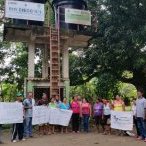English · Español

3 de noviembre de 2016 | Entrevistas | Agua
Community aqueducts
Human right to water ensured through self-sufficiency
Descargar: MP3 (2.1 MB)
In Colombia, a large part of the rural population and peripheral neighborhoods of urban centers organized themselves to build community aqueducts in order to have access to water as a response to its scarcity. To understand more about these resistance and sovereignty-building processes, Real World Radio interviewed Juan Pablo Soler, member of CENSAT-Agua Viva, Friends of the Earth Colombia and the Rios Vivos Movement.
From October 21-23, in the framework of the struggle against dirty energy, several groups organized a day of action to expand the capacity of a community aqueduct in Rio Ciego community, together with an association member of the Association of Producers for the Community Development of Cienaga Grande of Bajo Sinú (ASPROCIG). In addition to the above-mentioned organizations, the Community Peasant Reservoirs of Santander and Fundaexpresión also participated.
When asked to describe the essence of community aqueducts in his country, Soler highlighted that these “are not guided by profit, but they aim to ensure access to water. Self-sufficiency also represents the capacity to have sovereignty over this common resource”.
One of the main problems with these processes, according to the activist, is the high cost of energy. To solve this, the communities, mainly of Bajo Sinú region, are also undergoing energy self-sufficiency processes. Precisely, the day of action organized in Rio Ciego focused on the installation of a series of solar panels that allowed to double the water pumping capacity of the community.
“Water for mining or water for the cities”
The extractive industry has a long record in Colombia, and it has grown in the past years thanks to the actions implemented by Juan Manuel Santos´ administration.
According to Soler, this meant the expansion of the extractive borders, which in turn threatens the water supply of the rural communities. In Páramo de Santurbán, the intensive gold mining activities are compromising the water supply of the communities and the availability of water in the future, since they impact water reproduction cycles.
Also the growth of the agricultural border in different departments where the industrial agribusiness is advancing is causing the destruction of the water reproduction cycle. There, the community management of water is a proposal for communities to take charge of the management and preservation of their water sources “which are the only actions that ensure the availability of sufficient amounts of water”, said the Colombian activist.
Imagen: CENSAT












